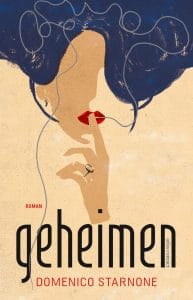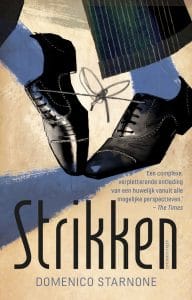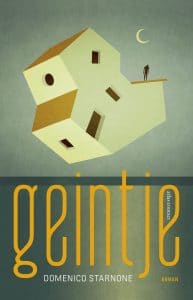Secrets is the title of Italian writer Domenico Starnone's (78) latest novel. But actually, as far as he is concerned, the secret is not what the story is about. 'It is about the fear we feel for the other, because the other always remains, under whatever circumstances, the ánother.'
Human behaviour
The delicately concise novels by Domenico Starnone - the author suspected to be hiding behind the pseudonym Elena Ferrante - are not only subtly witty, but also betray a great insight into human behaviour. In his new book Secrets high school teacher Pietro has a torrid relationship with a former student of his, Teresa, for several years. Shortly after confiding in each other their biggest secret, they break up, and some time later Pietro marries Nadia, with whom he has children. As Pietro gains increasing public fame because of his publications, he becomes gripped by the fear that Teresa will reveal his secret.

Secrets has thematic similarities to your previous novels Bows and Just kidding. Do they form a triptych?
'I cannot call it a trilogy, because I did not write them according to a preconceived plan. But indeed there are similarities in the themes, which crop up in basically all my books, such as family crises, generational differences, relationship problems. When people love each other, they tend to tell each other about aspects of their lives they find embarrassing and normally keep secret. Pietro exposing himself to Teresa makes him vulnerable. That act of confiding in the other plays the central role, the secret itself is not so important. Nor do we find out what they confessed to each other. It is about the fear we feel for the other, because he will always, whatever the circumstances, be the other; someone you can never quite control, simply because he is someone other than you. That is the theme of the book.'
It raises the question of whether it is not better to keep secrets to yourself instead of being completely honest.
'Precisely because Pietro has this fear of revelation, he leads a golden life and is always extremely sincere. His utter honesty is thus prompted by fear of the person he will simultaneously love all his life. Pietro becomes a great, highly respected teacher because he works from love, affection and affection, but meanwhile you can feel by everything that he is also weighed down by that rigour and honesty, because he is constantly driven by the fear that his secret will come out. But precisely because of this, he is also a balanced person.'

The Dutch title of your book is Secrets. The Italian title Confidenza means 'confidentiality' - a substantial difference. What do you think of that?
'This choice was also made in other languages, probably because it is difficult to properly capture the meaning of the Italian word "confidenza". "Confidenza" does not necessarily refer to a secret; that may be the subject of that confidenza, but it is mainly about taking someone into one's confidence. The title Secrets lacks the psychological side that Confidenza does have. Moreover, the title promises the reader something he does not get at all, as he will think: what about that secret? As mentioned, the book is not about the secret per se, but about the act of exposing and thus becoming dependent on the other person. The power shift between the two main characters.'
You have spent your life writing about complex relationships and how people can keep each other in check. What still fascinates you about that?
'In my view, no subject is more fascinating and inexhaustible than that. Our whole world is based on relationships and the desire to get close to each other. At the same time, nothing is more difficult than a relationship that is so deep that you hide nothing. Feeling relationships, sexual relationships, are an explosion of our desire to be the other, to take possession of the other and let the other take possession of us. But that is a mission impossible, no matter how much we try our best - the other, by definition, remains separate from us.'
Your parents had a difficult marriage with lots of arguments. Is that another reason why this topic continues to concern you?
'Maybe partly, although I wouldn't say that my childhood was so very different from that of other children in Naples - shouting and arguing is common there. I don't know if I had a difficult childhood, but I did experience my childhood as difficult. My father was a fascinating, intelligent man. My mother was very much in love with him, but was also crushed by him, though she was not submissive. They had a very violent relationship, with a lot of mutual cruelty. For instance, my father was very jealous, but my mother did nothing to prevent him from being jealous. I was very focused on my mother and her grief, and so I was hostile to my father, his outbursts and temper. Always I wondered how I could make him feel small. Experiencing their daily confrontations, the arguments, forms the basis of my books. Maybe writing about that helped me cope.'
Vain
Starnone falls silent for a moment, then continues: 'I will tell you what was for me a kind of discovery of literature. My parents had a violent night-time argument. We children were in bed and heard them shouting in Neapolitan dialect. In that cascade of Neapolitan, one Italian word exploded every now and then: vanesia, meaning "vanity". For us, and probably for my mother too, that word was incomprehensible; I think only my father knew its meaning.
For me, that's what literature is: a torrent of sentences that we understand and from which the occasional miraculous or incomprehensible word jumps out, making it unimaginably seductive and fascinating.'
Has writing about it offered you new insights?
'Yes. For years I thought my parents hated each other terribly. But now that I am old, I believe they actually loved each other very much. They gave each other a hard time, but were also strongly attached to each other - presumably their struggle was so intense because the attraction was also so strong.
It is difficult to judge their relationship because my mother died when she was just 40. Who knows how their relationship would have developed if she had lived longer.
The book I dedicated to their relationship, Via Gemito, in the last three pages, that difficult, aggressive relationship turns into a loving bond between two people in love who court each other. In doing so, I wanted to make it clear that relationships are just that: complicated and not always balanced and rational. Only in banal narratives are relationships always coherent. In real life, things are not all rosy.'

You are 78 by now. Some old writers feel they cannot die as long as they keep writing. Do you recognise that feeling?
'Yes, in that I agree with my colleagues. In a way, writing a book extends your life. Because when you start writing, the idea is still hidden and you want to keep living until that idea is worked out and you reach the last page. If you then immediately have another idea, a chain is created: you have to keep going! That gives me strength on a daily basis. As long as I still feel like writing, I stay alive.'
Translated by Manon Smits, 176 p., Atlas Contact, € 19.99
